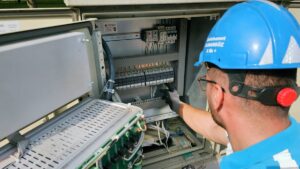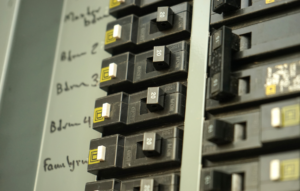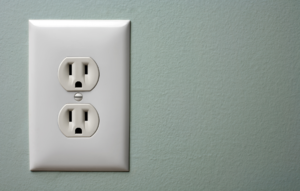Developing an effective commercial electrical maintenance plan is crucial for ensuring the safety, reliability, and energy efficiency of a business’s electrical systems. Proper maintenance can prevent costly downtime, extend the lifespan of electrical equipment, and reduce energy costs. At CMS Maintenance Service, we understand the importance of a well-structured maintenance plan for businesses in Alabama and Georgia. This comprehensive guide will help you develop an effective commercial electrical maintenance plan that meets your business’s unique needs.
Understanding the Importance of Electrical Maintenance
Commercial electrical maintenance involves regular inspections, testing, repairs, and upgrades to ensure that all electrical systems are functioning efficiently and safely. An effective maintenance plan helps to:
- Prevent electrical failures and downtime
- Ensure compliance with safety regulations
- Optimize energy efficiency
- Extend the lifespan of electrical equipment
- Improve overall business operations
Steps to Develop an Effective Electrical Maintenance Plan
- Conduct an Initial Assessment
- Start by conducting a thorough assessment of your current electrical systems. Identify any existing issues, outdated components, and areas that require improvement. This assessment will serve as the foundation for your maintenance plan.
- Create an Inventory of Electrical Systems
- Develop a detailed inventory of all electrical systems and equipment in your facility. This inventory should include information such as the age, condition, and maintenance history of each component. Having a comprehensive inventory will help you prioritize maintenance tasks.
- Establish Maintenance Goals
- Set clear, achievable goals for your electrical maintenance plan. These goals should align with your business objectives and address key areas such as safety, energy efficiency, and equipment reliability. Examples of maintenance goals include reducing downtime by 20%, improving energy efficiency by 15%, or ensuring 100% compliance with safety regulations.
- Develop a Maintenance Schedule
- Create a maintenance schedule that outlines when and how often each electrical system and component should be inspected, tested, and serviced. Your schedule should include:
- Routine inspections (monthly, quarterly, annually)
- Preventive maintenance tasks (cleaning, lubrication, testing)
- Predictive maintenance tasks (thermographic scanning, condition monitoring)
- Corrective maintenance tasks (repairs, replacements)
- Ensure that your maintenance schedule is flexible enough to accommodate unexpected issues and emergencies.
- Create a maintenance schedule that outlines when and how often each electrical system and component should be inspected, tested, and serviced. Your schedule should include:
- Implement Predictive Maintenance Techniques
- Predictive maintenance involves using advanced diagnostic tools and techniques to monitor the condition of electrical systems and predict potential failures. Implementing predictive maintenance can help you identify issues before they become major problems, reducing downtime and improving system reliability. Common predictive maintenance techniques include:
- Thermographic scanning
- Vibration analysis
- Electrical testing (insulation resistance, continuity, etc.)
- Condition monitoring
- Predictive maintenance involves using advanced diagnostic tools and techniques to monitor the condition of electrical systems and predict potential failures. Implementing predictive maintenance can help you identify issues before they become major problems, reducing downtime and improving system reliability. Common predictive maintenance techniques include:
- Allocate Resources and Budget
- Allocate the necessary resources and budget for your electrical maintenance plan. This includes funding for regular maintenance tasks, predictive maintenance tools, and any necessary repairs or upgrades. Ensure that you have a dedicated team or service provider to carry out the maintenance tasks.
- Train Your Staff
- Provide training for your staff on the importance of electrical maintenance and how to identify and report potential issues. Ensure that your maintenance team or service provider is well-trained and equipped to handle all aspects of electrical maintenance.
- Monitor and Evaluate Performance
- Regularly monitor and evaluate the performance of your electrical maintenance plan. Use key performance indicators (KPIs) to measure the effectiveness of your maintenance activities. Common KPIs include:
- Downtime frequency and duration
- Energy consumption and savings
- Number of maintenance tasks completed on schedule
- Equipment lifespan and reliability
- Use the data collected to make informed decisions and continuously improve your maintenance plan.
- Regularly monitor and evaluate the performance of your electrical maintenance plan. Use key performance indicators (KPIs) to measure the effectiveness of your maintenance activities. Common KPIs include:
Key Components of an Effective Electrical Maintenance Plan
- Routine Inspections
- Regular inspections are crucial for identifying potential issues and ensuring that all electrical systems are in good working order. Inspections should cover all components, including wiring, circuit breakers, lighting, HVAC systems, and electrical panels.
- Preventive Maintenance
- Preventive maintenance involves performing regular tasks to prevent potential issues from arising. This includes cleaning and lubricating components, testing electrical systems, and replacing worn-out parts. Preventive maintenance helps to extend the lifespan of equipment and reduce the risk of unexpected failures.
- Predictive Maintenance
- Predictive maintenance uses advanced diagnostic tools to monitor the condition of electrical systems and predict potential failures. By identifying issues early, businesses can schedule repairs and replacements before a major failure occurs. Predictive maintenance techniques include thermographic scanning, vibration analysis, and electrical testing.
- Corrective Maintenance
- Corrective maintenance involves repairing or replacing faulty components to restore the system to its optimal condition. This type of maintenance is performed in response to identified issues and is essential for maintaining the reliability and efficiency of electrical systems.
- Documentation and Reporting
- Keeping detailed records of all maintenance activities is essential for tracking the performance of your electrical systems and identifying trends. Documentation should include information on inspections, repairs, replacements, and any issues that were identified. Regular reporting helps to ensure transparency and accountability in the maintenance process.
Benefits of an Effective Electrical Maintenance Plan
- Improved Safety
- Regular maintenance ensures that all electrical systems are functioning safely, reducing the risk of electrical fires, shocks, and other hazards. This helps to protect your employees, customers, and property.
- Increased Reliability
- An effective maintenance plan helps to prevent unexpected electrical failures, ensuring that your business operations run smoothly. This reduces downtime and improves overall productivity.
- Enhanced Energy Efficiency
- Well-maintained electrical systems operate more efficiently, reducing energy consumption and lowering utility bills. This contributes to your business’s sustainability goals and improves your bottom line.
- Extended Equipment Lifespan
- Regular maintenance helps to extend the lifespan of electrical equipment, reducing the need for costly replacements. This results in long-term cost savings and a better return on investment.
- Regulatory Compliance
- Adhering to a structured maintenance plan helps to ensure compliance with safety regulations and industry standards. This reduces the risk of fines and legal issues and demonstrates your commitment to maintaining a safe working environment.
How CMS Maintenance Service Can Help
At CMS Maintenance Service, we specialize in providing comprehensive commercial electrical maintenance services in Alabama and Georgia. Our team of experienced electricians is dedicated to helping businesses develop and implement effective maintenance plans. Here’s how we can assist:
- Customized Maintenance Plans
- We understand that every business has unique electrical needs. Our customized maintenance plans are tailored to meet the specific requirements of each client, ensuring that all systems are maintained to the highest standards.
- Expert Technicians
- Our team comprises skilled and certified technicians with extensive experience in commercial electrical maintenance. We stay updated with the latest industry trends and technologies to provide the best possible service.
- Advanced Diagnostic Tools
- We use state-of-the-art diagnostic tools, including thermographic scanners and advanced testing equipment, to identify and address potential issues before they become major problems.
- Comprehensive Reporting
- After each maintenance visit, we provide detailed reports outlining the condition of your electrical systems and any recommended actions. This transparency ensures that you are always informed about the state of your electrical infrastructure.
- Emergency Services
- Electrical emergencies can happen at any time. Our emergency services are available 24/7 to address any urgent issues and minimize downtime.
Building a Foundation for Electrical Reliability
Developing an effective commercial electrical maintenance plan is essential for ensuring the safety, reliability, and energy efficiency of your business’s electrical systems. By conducting regular inspections, implementing preventive and predictive maintenance techniques, and allocating the necessary resources, businesses can prevent costly downtime, extend the lifespan of their equipment, and improve overall energy efficiency. At CMS Maintenance Service, we are committed to helping businesses in Alabama and Georgia achieve these goals through expert electrical maintenance services. Contact us today to learn more about our services and how we can help you develop a comprehensive maintenance plan tailored to your business’s unique needs.









